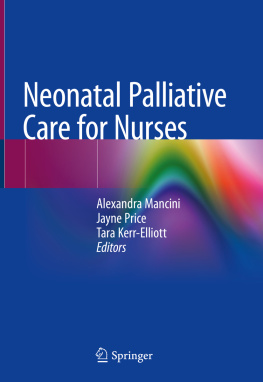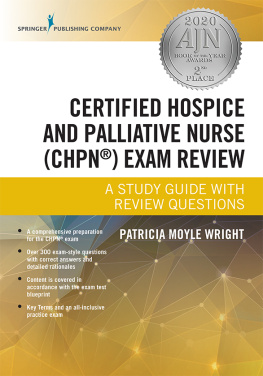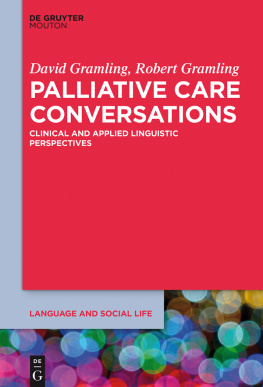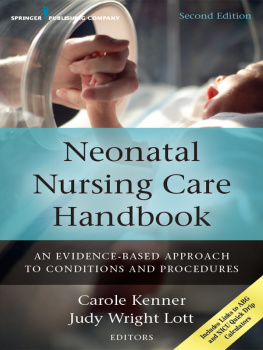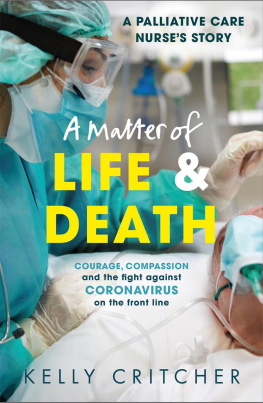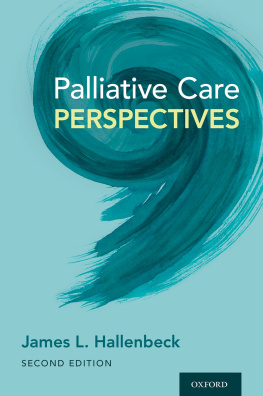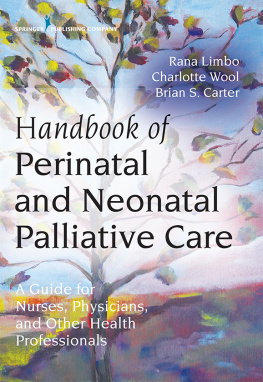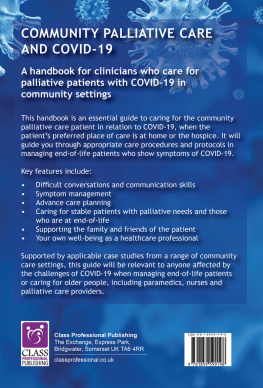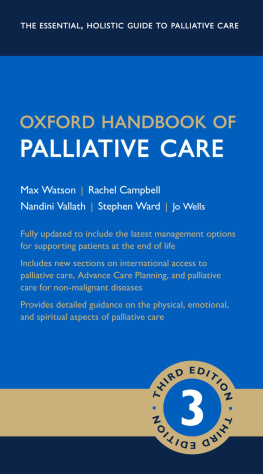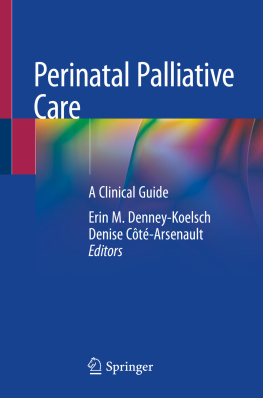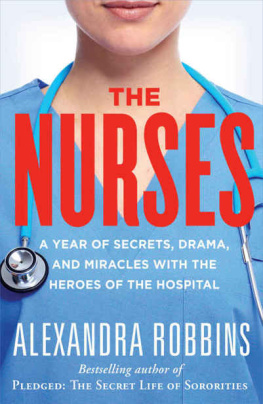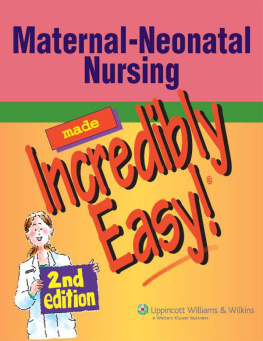Alexandra Mancini - Neonatal Palliative Care for Nurses
Here you can read online Alexandra Mancini - Neonatal Palliative Care for Nurses full text of the book (entire story) in english for free. Download pdf and epub, get meaning, cover and reviews about this ebook. year: 2020, publisher: Springer Nature, genre: Home and family. Description of the work, (preface) as well as reviews are available. Best literature library LitArk.com created for fans of good reading and offers a wide selection of genres:
Romance novel
Science fiction
Adventure
Detective
Science
History
Home and family
Prose
Art
Politics
Computer
Non-fiction
Religion
Business
Children
Humor
Choose a favorite category and find really read worthwhile books. Enjoy immersion in the world of imagination, feel the emotions of the characters or learn something new for yourself, make an fascinating discovery.
- Book:Neonatal Palliative Care for Nurses
- Author:
- Publisher:Springer Nature
- Genre:
- Year:2020
- Rating:3 / 5
- Favourites:Add to favourites
- Your mark:
- 60
- 1
- 2
- 3
- 4
- 5
Neonatal Palliative Care for Nurses: summary, description and annotation
We offer to read an annotation, description, summary or preface (depends on what the author of the book "Neonatal Palliative Care for Nurses" wrote himself). If you haven't found the necessary information about the book — write in the comments, we will try to find it.
Neonatal Palliative Care for Nurses — read online for free the complete book (whole text) full work
Below is the text of the book, divided by pages. System saving the place of the last page read, allows you to conveniently read the book "Neonatal Palliative Care for Nurses" online for free, without having to search again every time where you left off. Put a bookmark, and you can go to the page where you finished reading at any time.
Font size:
Interval:
Bookmark:
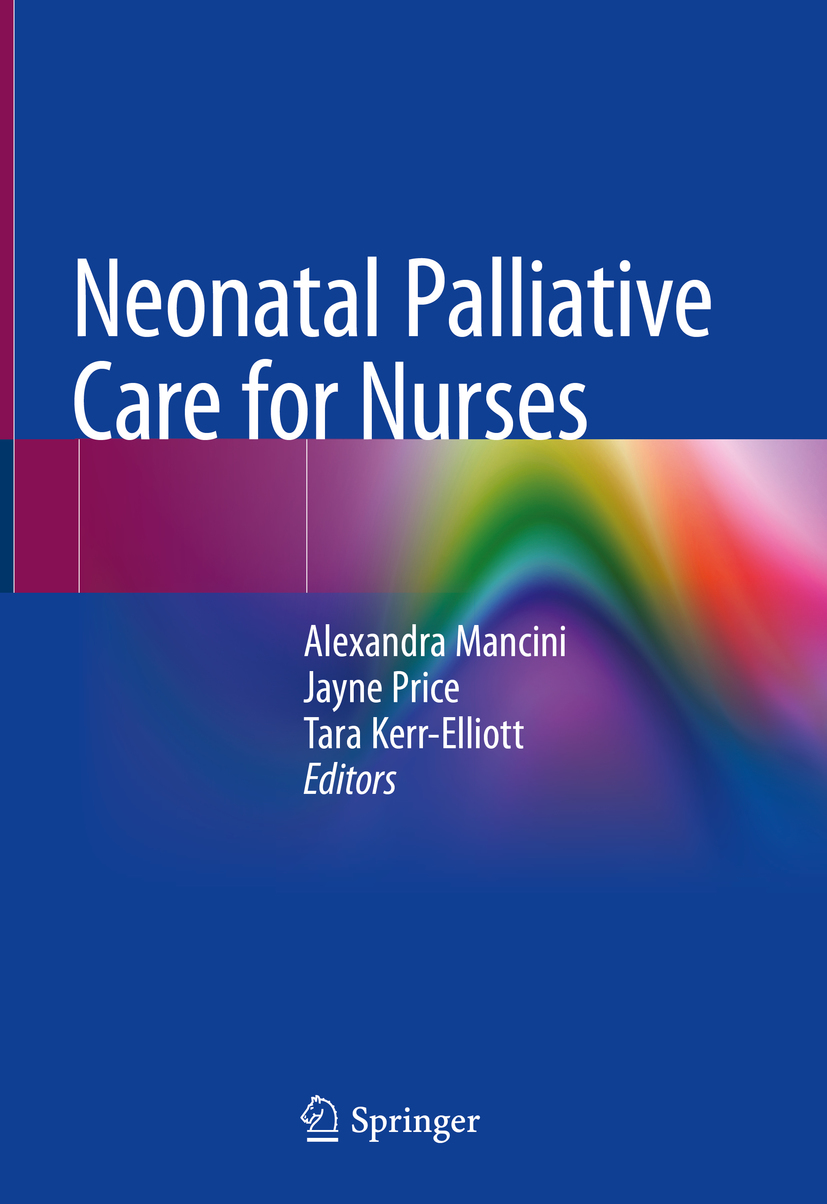

This Springer imprint is published by the registered company Springer Nature Switzerland AG
The registered company address is: Gewerbestrasse 11, 6330 Cham, Switzerland
Alex: To my amazing family,
My darling husband, Tony Smith,
Without his strength, vision and determination, this textbook would not have been possible.
He truly understood and got neonatal palliative care
Rest peacefully 6th January 2019
My three boys, Giancarlo, Giacomo and Robbie, I could not have achieved this mammoth task without your love, patience and encouragement.
For any parent, pregnancy and birth are times of great emotion, of hope and of plans for the future, with the expectation of having a healthy baby who will develop and grow up as part of their family. Yet for some, for those whose baby is diagnosed with or recognised as having a life-limiting or life-threatening condition, the reality is far different. Together for Short Lives states that Palliative care for babies, children and young people with life-limiting conditions is an active and total approach to care, from the point of diagnosis or recognition, throughout the childs life, death and beyond (Together for Short Lives (TfSL) 2017). The need for palliative care may be recognised prior to the birth of a child or once it has been bornhowever, regardless of when it is made, it is devastating to the family. For these parents, there is an intense time of sadness and grief, trying to understand what is happening to them, how they will cope and what they will tell their family and friends. The illness or death of their baby is a tragedy, a loss of their hopes and dreams for the future, and the provision of perinatal or neonatal palliative care is essential and can help them through the challenges. The majority of child deaths happen in the first month of life, with the greatest number of children in need of palliative care at the end of life globally dying from congenital anomalies (25.06%) or neonatal conditions (14.64%) (Connor and Sepulveda Bermedo 2014). Thus, the provision of appropriate perinatal and neonatal palliative care is essential and must be in place and available to those who need it. However, some conditions may be confirmed prenatally and have a clear prognosis, yet for others, this may not be the case, with uncertainty around diagnosis and/or prognosis. This is particularly the case in countries around the world where resources are restricted and access to diagnostic and treatment facilities are limited. Whether high-tech resources are available or not, each situation offers unique challenges, such as knowing when enough is enough and when to stop trying to preserve life at all costs, knowing how to access palliative care medications and ensuring that the baby is comfortable. However, key principles remain the same, such as putting the best interest of the baby first; providing care for the baby, their parents, siblings and wider families; ensuring good communication and collaboration; and providing care from diagnosis or when first recognising that the baby may have a life-limiting condition.
In some parts of the world, e.g. the USA, the application of palliative care to newborns in the neonatal intensive care unit has been evident for over 30 years (Carter 2018). However, in other parts of the world, the concept of perinatal and neonatal palliative care is still being understood and acknowledged. Alongside the increasing practice of perinatal and neonatal palliative care, there has also been an increase in the evidence base, with the number of publications increasing greatly in the past 30 years (Carter 2018). Chapters on perinatal and neonatal palliative care have begun to appear in childrens palliative care textbooks; however, this book is one of the first of its kind to focus solely on perinatal and neonatal palliative care, tackling challenging issues such as the ever-changing ethical and legal issues, alongside decision-making and the importance of effective communication. In the planning of care where flexible parallel care planning is paramount due to the unpredictability of prognosis, we need to ensure that care planning is reviewed continuously British association of Perinatal Medicine (BAPM 2010) and that the best interests of the baby are taken into account at all times.
This eagerly anticipated book should help give nurses, students and other professionals working within perinatal and neonatal palliative care some of the knowledge they need and empower them to gain skills and change attitudes. It brings together those working in neonatal, perinatal and childrens palliative care and identifies key learning points for each chapter. Throughout, the text is brought to life through case studies, enabling the reader to see how what they are reading can influence and change practice. Addressing the core components of communication, decision-making, ethical and legal issues, advance care planning, symptom management, end-of-life care, psychosocial issues, spirituality, support for staff, and teamwork, it then goes on to provide a snapshot from different countries around the world, so that experiences and lessons learnt can be shared. Whilst written for nurses, this book will appeal to a wider audience, including students and other professionals working in the field. I encourage you to read and learn from this book to gain new knowledge and new insight such that you can provide palliative care within the perinatal period for both the foetus and/or baby and their families. I commend Alex, Jayne, Tara and all the authors for taking the time to develop and write this book to share their years of experience in the field and empower individuals around the world to provide quality perinatal and neonatal palliative care.
Font size:
Interval:
Bookmark:
Similar books «Neonatal Palliative Care for Nurses»
Look at similar books to Neonatal Palliative Care for Nurses. We have selected literature similar in name and meaning in the hope of providing readers with more options to find new, interesting, not yet read works.
Discussion, reviews of the book Neonatal Palliative Care for Nurses and just readers' own opinions. Leave your comments, write what you think about the work, its meaning or the main characters. Specify what exactly you liked and what you didn't like, and why you think so.

